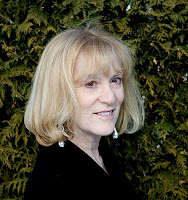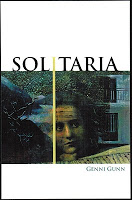I was delighted to have the chance to talk to Genni Gunn after reading her newest novel Solitaria. She is a fellow Canadian writer who has a BFA and an MFA from UBC. Genni has written a variety of books, including collections of poetry and short stories.
TKM: You are one of few writers I’ve encountered who has a degree in writing. How would you say that has influenced your writing?
 Genni Gunn: My decision to do a degree in writing occurred in a roundabout way. Music and writing have been constants in my life. I went the musician route first, did three years of a Bachelor of Music and then played in different bands for a number of years. At a certain point, I decided I didn’t want to be on the road anymore, living that particular life, so I returned to university to hone my writing skills.
Genni Gunn: My decision to do a degree in writing occurred in a roundabout way. Music and writing have been constants in my life. I went the musician route first, did three years of a Bachelor of Music and then played in different bands for a number of years. At a certain point, I decided I didn’t want to be on the road anymore, living that particular life, so I returned to university to hone my writing skills.
I was very fortunate, because in the years I was at UBC, one of the professors I studied under (Robert Harlow) was the most amazing writer/teacher/mentor anyone could have. I am indebted to him for much of what I learned about the writing craft during those years.
Of course, it influenced my writing, in that Bob did not mince words, and would point out every single writing sin anyone made. He would not tolerate clichés, bad turns of phrase, sloppy sentences, etc. He wanted us to be aware of the different ways that a story could be told. In other words, he wanted us all to strive to be the best writers we could be. This does not mean that he influenced our styles, but that he taught us craft. And a facility with craft is what allows the writer to express, experiment and explore narrative in original ways.
TKM: Your bio sounds similar to your character David’s. Would you say that he is a reflection of yourself?
Genni: I think all characters contain some parts of the author, and David is no exception. Is he a reflection of me? In some ways yes, and in some ways no.
Like David, I was born in Italy, but I lived there for the first ten years of my life, versus David who comes to Canada as a newborn. This sounds like a tiny detail, but childhood is a monumental time for building character and for beginning to understand how to manoeuvre one’s way into the world.
Whereas David is perplexed and bewildered by the larger-than-life Italian family, I am both participant and onlooker, and totally comfortable within it. Where I think we are similar, is in our identity, both of us with one foot in each culture.
TKM: You write detailed descriptions of Italy. Do these come from your memories or did you return to Italy to research the novel?
Genni: I have many relatives in Italy, and I went back every year for a number of years to do research (how fabulous is this?) on the novel. I carried a notebook and a laptop and a recording device, and took extensive notes, probably much to the annoyance of some people. Superimposed on this were my memories of Italy as a child, though not in the locations that the novel takes place, and not in the era of the novel.
TKM: Do you have a regular writing routine? If so, what is it?
Genni: I have a regular writing routine for about eight months of the year. The other four, I teach Creative Writing (September – December), so I don’t have time to write, but I make notes and keep an idea journal. When I’m not teaching, my regular routine is something like this: I work 8:00 am to 5:00 pm weekdays, and during those hours I can write or read or research. If I have nothing to write, I make notes. If I’m working on a novel, I give myself a 3-page-a-day minimum. So I consider myself fairly disciplined. However, life often interferes with my plans, and I go with that.
TKM: I was pleasantly surprised to see that the main character is from Vancouver. Most Canadian writers I’ve read set their novels in the States. Why did you chose Vancouver as David’s hometown?
Genni: I chose Vancouver because I live in Vancouver and it’s a place I know and love so well. I don’t think I’d set a novel in a place I hadn’t been to, unless I did a lot of research, and even then, I’d have to be in the place to really understand the feel of it. What you can never get from only research is the sound of a place, the cacophony or silence of it, the scents and whiffs of foods or vegetation or animals. And of course, the snatches of conversations, the way people dress and look at each other, etc. – all these types of things can only be gleaned through observation.
TKM: Do you think it’s harder to be a writer north of the 49th?
Genni: I haven’t ever thought of it that way. Being a writer is both difficult and exhilarating, and I don’t think geography can change that. Writers, like other artists in the cultural sector, are statistically the highest educated and the lowest paid. Yet we all continue to do what we love.
TKM: What advice would you offer to new writers?
Genni: Keep writing. Don’t be satisfied by the first thing that comes into your mind – it’s most likely the obvious. Dig deeper. Don’t be afraid to use the delete button. Edit, edit, edit. Revise, revise, revise.
Thanks, Genni!
Genni is giving away a copy of her book! Just leave a comment here to be entered in the draw. I’ll draw one lucky reader on FRIDAY to receive a copy of Solitaria. (Contest open to residents of Canada and the United States only.) To find out more about Genni Gunn or her books, drop by her website.

10 Comments
This book looks really good!
Thank you all for your kind responses and I hope you enjoy the short stories.
Genni Gunn
Lorna – you are the lucky winner! I’ll pass your contact info on to Genni and she’ll send you the book. Thanks for dropping by!
Enjoy reading the interview. Would like to read her books, especially her short stories.
I very good interview. I learned there are many ways to tell a story,and to dig deeper. Would like to read the book.
Addy – thanks!
Jan – I highly recommend it. I just picked up a copy of Genni’s short stories and am looking forward to reading them.
Jack – I was pleasantly surprised to find that Genni is a Canadian writer. Most authors I read are American, other than fellow Inscribers. 🙂
Pam – true!!! Every writer I’ve met has been very friendly and encouraging.
“We’re the highest educated.” That makes me feel good. At least we esteem each other highly as writers, even if society doesn’t! ha ha.
Pam M.
This is the first of your interviews I’ve read and I like it! Thanks for focusing a couple of questions on the Canadian content–Vancouver setting.
Excellent interview.. Would love to read the book.
Blessings,
Jan
This is a very good interview with many positive answers. I enjoyed reading it.